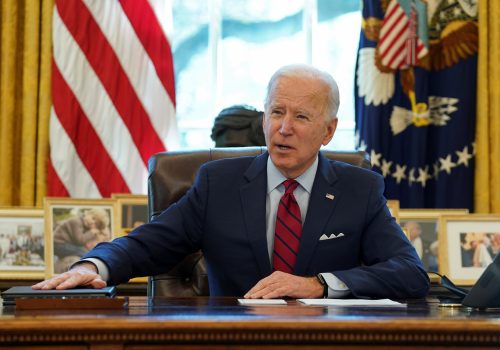Israel’s upcoming election: A referendum on the handling of the coronavirus
March 23 will see Israelis trek to the polls—for the fourth time since April 2019—after the close of an election campaign that has, thus far, entertained discussion of little else other than the coronavirus and its ramifications.
COVID-19 has earned singular status as a potential game-changer in Israeli political life. In a recent Israel Democracy Institute survey, only 24 percent of Israelis awarded a positive score to the incumbent government’s handling of the public health crisis, voicing even lesser approval for its measures to mitigate economic and social fallout from the pandemic. These numbers contrast markedly with the 57 percent and 48 percent of Israelis who praised their government’s performance in the realms of foreign policy and national security, respectively. Failure to curb the deleterious effects of the virus could deliver a coup de grâce to the career of Benjamin Netanyahu, the longest reigning prime minister in Israel’s history.
There have been approximately 5,500 COVID-19 fatalities in Israel, where more than 52,000 active cases are still being monitored among its population of nine million people. With the country emerging gradually from its third lockdown, it is Israeli citizens’ critical deliberation of their leadership’s fumbling response to the outbreak that has eclipsed attention paid to all additional items on a full national agenda.
Israeli Prime Minister Benjamin Netanyahu appeared briefly in Jerusalem District Court on February 8 to plead not guilty to multiple counts of bribery, fraud, and breach of trust. The high drama of that event aside, his indictments have been proceeding through the Israeli legal system for years already and have been the focal point of long-running protests. Israelis have had ample opportunity to formulate their views on whether Netanyahu’s alleged wrongdoing should disqualify him from serving as prime minister and, as such, the impact of his trial—which promises to continue long into the future—on voting patterns has been factored comprehensively into the results of the previous three ballots.
The advent of the coronavirus has also superseded debate of the extent to which President Joe Biden is recalibrating Israel’s premier alliance with the United States. It took Biden until February 17—almost a full month after moving into the Oval Office—to speak with Netanyahu, a fact not lost on watchers of the US-Israel relationship. That the prime minister’s challengers have not exploited this opening to lambaste his apparent “fall from grace” in Washington speaks, in part, to the public’s present disinterest in matters not related to the spread of COVID-19. Similarly, Netanyahu’s repeated postponements of his planned visits to the United Arab Emirates and Bahrain suggest an understanding that a photogenic celebration of the popular Abraham Accords is equally unlikely to distract Israelis.
Netanyahu, who regularly leveraged the political capital of his close bond with Biden’s predecessor in office, has been put on the defensive by the new administration, which has acted quickly to attenuate the force of—or even reverse—certain decisions of Donald Trump which Israel applauded. US moves to reinvigorate diplomacy with Iran and to renew America’s membership on the Geneva-based United Nations Human Rights Council—renowned for its “disproportionate focus on Israel,” as acknowledged on February 8 by State Department spokesman Ned Price—have clarified that Netanyahu’s charms have been less than effective on the current White House. He bristled perceptibly after Secretary of State Tony Blinken issued an only tentative endorsement of Trump’s earlier recognition of Israeli sovereignty over the Golan Heights. And, yet, Israel’s relations with Biden’s team continue to be a work in progress, which also contributes to Israelis withholding final judgment at this time.
Instead, what consumes bandwidth are practical questions of government mismanagement with respect to COVID-19 protocols. Israeli decision-makers stand accused of ignoring early professional advice to padlock Ben-Gurion International Airport—which was shuttered almost totally to traffic only in January—for purely political considerations. The same motive has been tendered as an explanation for what many have deemed to be the selective enforcement of lockdown restrictions.
Israel’s most prominent feat in battling the pandemic—the acquisition of many millions of vaccinations and the rollout of a coordinated, nation-wide effort to administer the injections— also appears to be losing steam. Half of all Israelis have received at least one dose to date, but inoculation facilities are now operating below capacity as holdouts among the remaining half have resisted being immunized. Infection rates, which are showing signs of finally slowing down, had skyrocketed due to new and more contagious mutations of the virus which were imported unknowingly to Israel, challenging health care providers to keep apace.
With Election Day less than five weeks away and a full reopening of Israel likely to take much longer, members of the Netanyahu government are scrambling anxiously to balance the demands of the population for a return to “normal life” with the imperatives of ensuring everyone’s physical wellbeing. Approval was granted on February 9 for preschools and grades 1-4 to resume classroom study in cities where the disease has been brought under relative control. Another matter of great contention is a timetable for permitting commercial and cultural institutions to receive patrons once again, a stage scheduled to commence on February 21. The temptation is high for Netanyahu to declare “mission accomplished” before Israelis go to vote on March 23.
Hopes that Israel is on a fast track to recovery are substantiated by some relevant data, but Israelis are not out of the woods yet. Amid charges that the country lacks an effective exit strategy from its predicament, one senior medical advisor to Israel’s National Security Council has warned that it could soon be necessary to “choose between a fourth closure and a spike in serious cases and deaths.” For Netanyahu—who has not been shy about touting the success of his government’s vaccine program—either of those two outcomes could trigger his political demise.
Shalom Lipner is a nonresident senior fellow for Middle East Programs at the Atlantic Council. From 1990 to 2016, he served seven consecutive premiers at the Prime Minister’s Office in Jerusalem. Follow him on Twitter @ShalomLipner.
Image: Israeli Prime Minister Benjamin Netanyahu speaks during a visit to Leumit Health Care Services vaccination facility in Jerusalem where he meets the 4,000,000 person who had been vaccinated in Israel, February 16, 2021. Alex Kolomoisky/Pool via REUTERS


